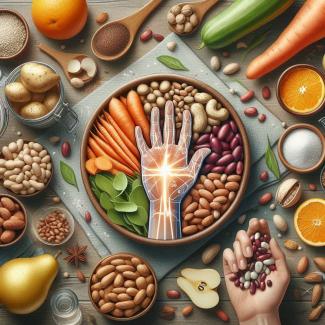
Zinc is an essential trace mineral that plays a critical role in numerous physiological functions in the human body. Despite being required in relatively small amounts, its impact on health is profound. This comprehensive description will delve into the multifaceted effects of zinc, its significance in the immune system, cell growth and renewal, as well as its sources and health implications.
What Role Does Zinc Play in the Functioning of the Immune System, Growth, and Cell Renewal?
Zinc is vital for the proper functioning of the immune system. It is a cofactor for more than 300 enzymes involved in various biochemical processes, including immune response. Research indicates that zinc plays a crucial role in maintaining the integrity of the immune system by regulating the functions of immune cells such as T lymphocytes and macrophages. A study published in the journal Nutrition Reviews highlights that zinc deficiency can impair the immune response, making individuals more susceptible to infections (Prasad, 2008).
In addition to its role in immunity, zinc is essential for growth and cell renewal. It is involved in DNA and RNA synthesis, which is crucial for cell division and proliferation. A deficiency in zinc can lead to stunted growth and developmental issues, particularly in children. According to a review in The American Journal of Clinical Nutrition, adequate zinc levels are necessary for proper growth and development, particularly during periods of rapid growth such as childhood and adolescence (Brown et al., 2009).
Discover the Secrets of How Zinc Works in the Body!
Zinc operates as a signaling molecule and is integral to various signaling pathways in the body. It helps modulate the activity of over 1,000 transcription factors, which control gene expression and influence cellular responses to external stimuli. This regulatory role extends to inflammation, apoptosis, and oxidative stress, highlighting zinc's importance in maintaining cellular homeostasis.
Moreover, zinc is essential for maintaining skin health. It possesses anti-inflammatory properties and contributes to the healing of wounds. A study published in the Journal of Dermatological Science found that zinc promotes fibroblast activity and collagen synthesis, key processes in skin repair (Kumar et al., 2015). Thus, zinc's multifaceted roles in the body underscore its importance in both metabolic and physiological processes.
How Zinc Affects Health!
The health effects of zinc are extensive and diverse. Zinc deficiency is associated with a myriad of health issues, including impaired immune function, skin disorders, delayed wound healing, hair loss, and even mental health issues such as depression and anxiety. Studies have shown that low zinc levels can exacerbate the severity of respiratory infections and may even influence the outcome of viral infections (Hemilä, 2017).
Conversely, adequate zinc intake is linked to numerous health benefits. It has been found to enhance immune response, improve wound healing, and support cognitive function. Furthermore, some research suggests that zinc supplementation may reduce the duration and severity of the common cold (Maggini et al., 2018).
Can I Get It from Food, or Where Can I Get It?
Zinc can be obtained from a variety of food sources. Rich dietary sources include:
- Meat: Beef, lamb, and pork are excellent sources of zinc.
- Seafood: Oysters are particularly high in zinc; they contain more zinc per serving than any other food.
- Dairy Products: Milk, yogurt, and cheese provide a good amount of zinc.
- Legumes: Beans and lentils contain zinc, though its bioavailability is lower than from animal sources.
- Nuts and Seeds: Pumpkin seeds, cashews, and hemp seeds are good plant-based sources of zinc.
- Whole Grains: Whole grain bread and cereals can contribute to zinc intake, though they also contain phytates, which may inhibit zinc absorption.
A balanced diet typically provides sufficient zinc for most individuals. However, certain populations, such as vegetarians, pregnant or breastfeeding women, and the elderly, may be at higher risk for zinc deficiency and might need to monitor their intake more closely.
What Commercial Products Are Available in the Market?
There are various commercial zinc supplements available on the market, including:
- Zinc Gluconate: Commonly used in lozenges and tablets; it is well-absorbed and gentle on the stomach.
- Zinc Acetate: Often used in cold medications, known for its efficacy in treating cold symptoms.
- Zinc Picolinate: This form is believed to have higher absorption rates.
- Zinc Citrate: A chelated form that is easily absorbed and often used in dietary supplements.
While zinc supplements can be beneficial, it is essential to consult a healthcare professional before starting any supplementation, as excessive zinc intake can lead to toxicity and adverse effects.
How Do We Test That My Body Has Enough Zinc?
The most reliable method to assess zinc status is through blood tests that measure serum zinc levels. However, serum zinc can vary widely due to factors like recent meals, stress, and illness. Therefore, healthcare providers often consider clinical signs of deficiency, dietary history, and other laboratory assessments, such as assessing plasma zinc and hair zinc levels.
Another method includes the measurement of zinc levels in the urine, though this is less commonly used due to variability in urine concentrations. A comprehensive evaluation by a healthcare professional is necessary for an accurate assessment.
When Is It Time to See a Doctor: Symptoms You Shouldn't Ignore!
Symptoms of zinc deficiency can range from mild to severe and may include:
- Frequent infections or illness
- Slow wound healing
- Hair loss and skin lesions
- Loss of appetite and taste changes
- Cognitive impairments, such as difficulties with concentration and memory
- Unexplained fatigue
If you experience any of these symptoms, especially if they persist or worsen, it is advisable to seek medical attention. A healthcare professional can conduct appropriate tests and recommend treatment options if necessary.
Zinc is a crucial mineral that plays a significant role in various bodily functions, from immune response to growth and cell renewal. Understanding its importance, dietary sources, and potential health impacts can help individuals make informed choices about their nutrition and overall health. Regular monitoring of zinc status and consultation with healthcare professionals are essential to maintain optimal health and prevent deficiency.






